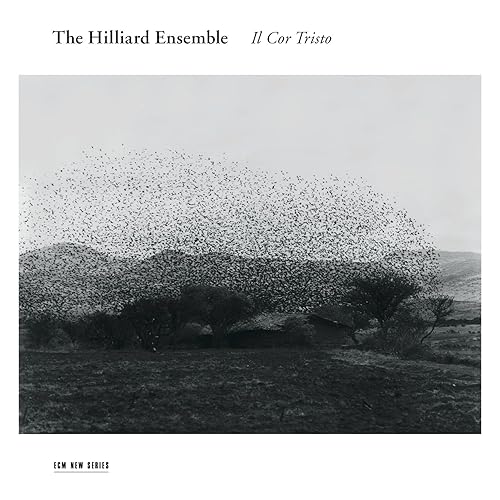Program: #14-02 Air Date: Jan 06, 2014
To listen to this show, you must first LOG IN. If you have already logged in, but you are still seeing this message, please SUBSCRIBE or UPGRADE your subscriber level today.
We begin our new year with a remarkable folk project from June Tabor (born on New Year’s Eve), the Hilliard Ensemble in 16th century Italy, and a remarkable contemporary take on Pergolesi.
NOTE: All of the music on this recording is from recordings on the ECM label. For more information, you may visit:
I. Il Cor Tristo (The Hilliard Ensemble) ECM CD 2346 4810637.

One of the world’s finest vocal chamber groups, the Hilliard Ensemble, is unrivalled for its formidable reputation in the fields of both early and new music. The programme featured here exemplifies its distinctive style and highly developed musicianship in both repertoires. At its heart is a work commissioned by the ensemble from British contemporary composer Roger Marsh: Il Cor Tristo, a setting of cantos 32 and 33 from Dante’s Inferno, which deftly blends Renaissance techniques with a modern idiom. Marsh’s composition frames madrigals by 16th century composers Bernardo Pisano (1490-1548) and Jacques Arcadelt (c 1507-1568). As so often with the Hilliard singers, the transitions between “old” and “new” are seamless…
BERNARDO PISANO:
- 01 Or vedi, Amor (“Now you see, Love”)
- 02 Nova angeletta (“A new young angel carried by her wings”)
- 03 Chiare, fresche, e dolci acque (“Clear, sweet, fresh water”)
- 09 Si è debile il filo (“The thread on which my heavy life hangs”)
- 10 Ne la stagion (“At the moment when the swift sky turns”)
- 11 Che debb’io far? (“What must I do?”)
II. Quercus ECM CD 2276 372 4555

June Tabor voice
Huw Warren piano
Iain Ballamy saxophones
|
‘Quercus’ means ‘oak’ in Latin and the roots of this particular tree dig deep into British folk music, while leaves and branches reach upward to embrace jazz-inspired lyrical improvising. The trio features the venerable English singer June Tabor whose dark voice has an uncanny ability to underscore the emotional essence of a ballad: “As I get older, I understand more the depths of sorrow and joy that made the song”, she has said. Tabor, who was recently voted BBC Folk Awards Singer Of The Year, is joined in the Quercus project by Welsh jazz pianist and composer Huw Warren, and by English saxophonist Iain Ballamy, well-known to ECM listeners as co-leader of the band Food. This is the first Quercus album but the trio has existed already for seven years, patiently developing its unique idiomatic blend. |
Lassie Lie Near Me
Come Away Death
As I Roved Out
The Lads In Their Hundreds
Teares
Near But Far Away
Brigg Fair
Who Wants The Evening Rose
This Is Always
A Tale From History (The Shooting)
All I Ask Of You
III. Il Pergolese ECM CD 2340 4810 427.

Maria Pia De Vito voice
François Couturier piano
Anja Lechner violoncello
Michele Rabbia percussion, electronics
|
Il Pergolese pays tribute to 18th century composer Giovanni Battista Pergolesi (1710 – 1736), and considers his relationship to the art music and the popular music of Naples, from a highly contemporary perspective. The text of the Stabat Mater – translated into Neapolitan by Maria Pia De Vito – and the opera arias, are transformed into songs and vivid narrative, open frames providing the key to reinterpreting Pergolesi. François Couturier's arrangements widen Pergolesi's structures, offering space for improvisational interaction. But this is a real group project, a discourse among acoustic sounds, with rhythms of drums and metals, and sampled and real-time electronics. Sound textures grow dense with the richness of instrumental counterpoint or are set free in electronic soundscapes and along coloristic, percussive lines, as cello becomes voice or voice becomes an instrument. The project was commissioned by the Festival Pergolesi-Spontini of Jesi in 2011. The present version was recorded in Lugano in December 2012, and produced by Manfred Eicher. |
--After Pergolesi:
Ogne pena cchiù spietata (“I bear the ruthless pain you give”)
Amen/ Fac Ut Portem (from the Stabat Mater)
Sinfonia for violoncello
Chi disse ca la femmena (“Who can say about women?”)
Tre giorni son che Nina
Composer Info
Bernardo Pisano (1490-1548), Giovanni Battista Pergolesi (1710 – 1736)
CD Info
ECM CD 2346 4810637, ECM CD 2340 4810 427, ECM CD 2276 372 4555,
